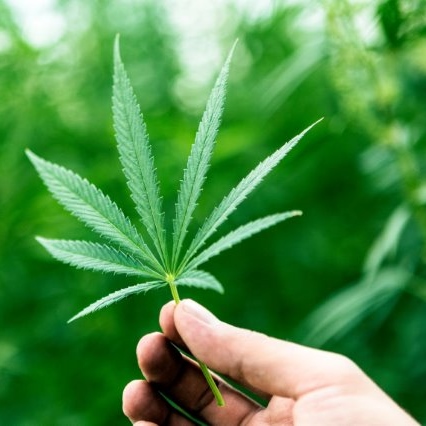click to dowload our latest edition
CLICK HERE TO SUBSCRIBE TO OUR NEWSLETTER


Published
5 years agoon
By
adminGUS SILBER
It’s Shabbat dinner, and between the lighting of the candles and the clearing of the plates the conversation turns, as it often does, to matters of Biblical interpretation.
Specifically, that incident of the burning bush in the Book of Exodus. Remember?
Moses gazes into the flames, and in a blinding glow of heavenly light he sees a vision of his calling: to go forth and liberate a people.
So, it is written, and so, unto the generations, has it been understood. But tonight, the young tech entrepreneur at the table – let’s call him Dov – is making a case for a different take on the age-old tale.
What if the bush wasn’t just a random bed of mountain bramble, he suggests. What if it was a special plant, a sacramental plant, a plant whose essence holds the power to heal, to soothe, to anoint, to open the mind and enlighten?
He presses a thumb and forefinger to his lips and mimes the act of inhaling. What if Moses was actually a bit of a stoner?
Once, not too long ago, to even raise such a proposition in a traditional Jewish household might have been to incite shock, scandal, perhaps even outrage.
Now, in his home community of Sea Point, Dov is finding that, Shabbat after Shabbat, the topic is high on the agenda of casual discussion and people are only too happy to venture an opinion on the benefits, or otherwise, of the recreational use of marijuana.
Dov has been a regular user for 15 years, since his early 20s, and even if his early experiences were furtive and clumsy – he recalls dropping a joint in a jacuzzi when a friend’s mother barged in to investigate that tell-tale sweet smell – he feels now as if a weight has been lifted from his shoulders.
“There is still a bit of a fear that people may be judgemental if they find out that you smoke weed,” he says, “but for me, the big meaning of the change is that I feel less stigmatised.”
The change, of course, is the recent Constitutional Court judgement, based on the right-to-privacy provision, that it should no longer be a criminal offence for an adult individual to grow, cultivate, possess and use marijuana in private.
The judgement has yet to be ratified in South African law, or put to the test to determine precisely where the line should be drawn between private and public.
But for even the most moderate occasional user, gone are the days of worrying about winding up in a holding cell, as happened, when he was still a teen, to a Johannesburg creative-agency owner who we’ll call Marcus.
“That got me into trouble with my parents,” he says. But it didn’t stop him from smoking. He’s 38 now, with an easy-going nature that belies the stresses and intensity of his job.
The weed helps him cope, but he never lights up in the workplace – only at home, and only after dark. His habit may now be legally acceptable, but that strain of discretion lingers, although he disputes the common assertion that smoking marijuana makes you paranoid.
“The paranoia comes from the fear that you’re doing something illegal,” he says, “so that doesn’t apply anymore.”
For Dov, whose field of work is driven by change, innovation and out-of-the-box thinking, there can be no doubt that marijuana helps to stir up the creative juices. But there is an important caveat.
“I get a fire hose of ideas when I smoke,” he says, “but very often I’ll review those ideas later, and some of them will make no sense to me.”
A bigger benefit, he believes, is that a little marijuana helps him to see his challenges and problems in a whole new light.
“My favourite saying,” says Dov, “is that you can’t see the label from inside the bottle. You’ve got to be able to shift your perspective.” Which brings us to the big question, from a Jewish point of view: Is the label kosher? Marcus believes that it is.
“I’ve heard that weed is kosher for Pesach, even,” he says.
The official view is a bit more, well, nuanced. In a famous ruling in 1973, when asked to respond to a group of Israeli yeshiva students who wanted to use hashish, Rabbi Moshe Feinstein decreed, in short: no.
The rabbi’s chief concern was that illegal drug use could lead to a precipitous moral decline, but he worried also that young people would be encouraged to defy parental wishes, and contravene the injunction in Leviticus that calls on us not to indulge excessively in bodily pleasures.
By 2013, however, new research and attitudes were beginning to prevail, leading Rabbi Efraim Zalmanovich to declare that cannabis was kosher, albeit for medicinal rather than recreational purposes.
Around the Shabbat table, Marcus has identified three common attitudes towards marijuana, in the light of its legalisation.
There are those, typically older and more traditional, who are staunchly opposed to it; there are those who are curious and intrigued and would like to give it a try sometime; and there are those, the majority, who don’t and won’t smoke, but are non-judgemental and tolerant.
But the choice is yours. Whether that burning bush is a clump of bramble, or a crop of the variety that people have been growing, cultivating and using since Biblical days, you’re free, in private, to make that informed decision on your own.
